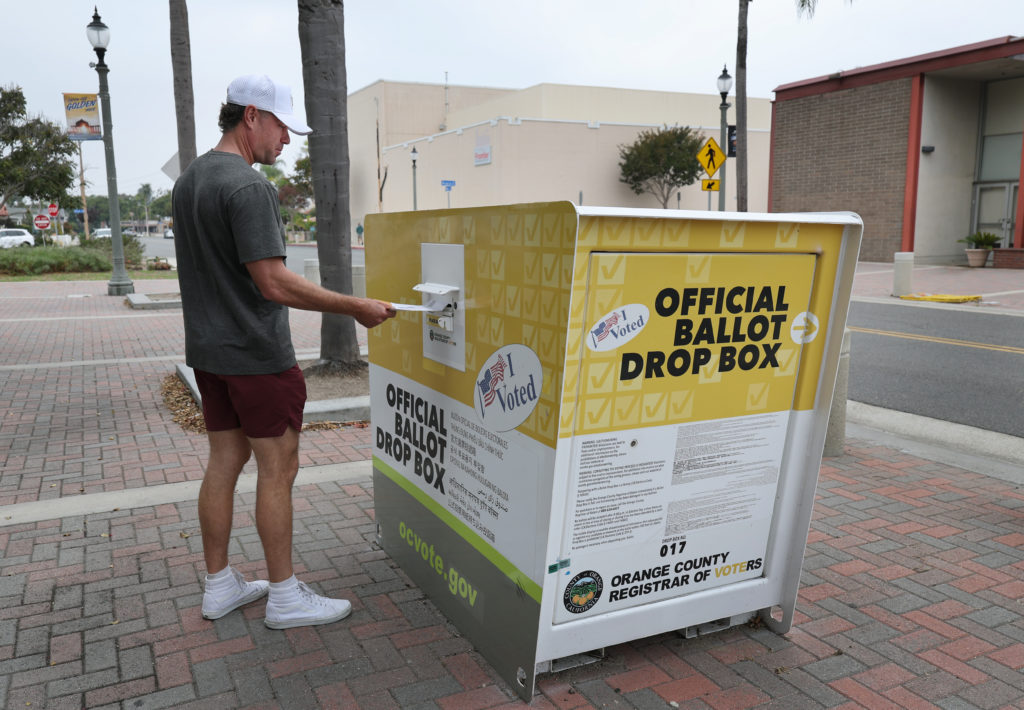Listen to the article
Majority of Americans Support Mail-in Voting Despite Fraud Concerns
A recent Pew survey reveals that most Americans support allowing anyone to cast a mail-in ballot, while simultaneously favoring government-issued photo ID requirements at polling stations. The findings come as Maine voters recently rejected a measure that would have implemented stricter voter ID requirements.
The White House has provided a list of statements supporting concerns about fraudulent voting, though much of this information doesn’t substantiate claims of widespread voter fraud, according to an analysis by PBS News.
California’s voting practices have come under particular scrutiny. The state doesn’t require voter ID at polling locations, though it does mandate a driver’s license number, state ID number, or the last four digits of a Social Security number for voter registration.
California is one of eight states, along with Washington D.C., that mail ballots to all active registered voters. An additional 20 states permit “no-excuse” absentee voting by mail.
The White House referenced the bipartisan Carter-Baker Commission from 2005, which found that “absentee ballots remain the largest source of potential voter fraud.” However, former President Jimmy Carter issued a statement in 2021 expressing disappointment with how the report was being “selectively referenced,” noting that “vote by mail practices have progressed significantly” since the report’s publication.
Election officials across the country employ numerous verification measures to protect mailed ballots from tampering. Multiple government and independent analyses have consistently shown that voter fraud, including by mail, is rare.
The White House also pointed to Election Administration and Voting Survey data showing that California sent out over 23 million mail-in ballots in 2024, with only about 13.1 million returned. However, unreturned mail-in ballots are not counted as votes, and California requires signature verification that must match records on file with election offices.
Another point of contention involves non-citizen voting. While San Francisco allows non-citizens to vote in local school board elections, the city explicitly prohibits non-citizens from voting in “any other local, state, or federal election,” in accordance with federal law.
The Department of Justice filed a lawsuit against Orange County in June regarding access to information about non-citizens on voter rolls after 17 non-citizens were reportedly registered to vote there. However, the lawsuit does not allege that any non-citizens actually cast votes. Orange County Registrar of Voters Bob Page stated he was “not aware of any specific voter fraud committed during the 2025 Statewide Special Election.”
In September, California was one of six states sued by the Justice Department over voter data. The lawsuit noted California reported over 2.1 million duplicate registrations in the 2024 election cycle—approximately 15.6% of total registered voters. However, California officials explained that some counties are “unable to distinguish between new, duplicate, or updated online registrations.”
California’s Secretary of State responded to the DOJ lawsuit by stating, “State law is clear—California has a legal obligation to protect our voters’ sensitive private information.” The state maintains that VoteCal, its centralized voter database, regularly scrubs its list against death records, change of address information, and felony records.
One isolated incident involved an Orange County woman facing felony charges for registering her dog to vote and casting multiple ballots. The dog’s vote was counted in the 2021 gubernatorial recall election but rejected in the 2022 primary. The woman self-reported to authorities in 2024 and was charged in September 2025.
These debates over election integrity continue a pattern that began during the 2016 election. At that time, a presidential commission was formed to investigate alleged voter fraud but was dissolved in 2018 without any major findings of widespread fraud.
Despite ongoing controversies, California voters recently passed Proposition 50 by a substantial margin of nearly 2.3 million votes, according to current vote counts.
Fact Checker
Verify the accuracy of this article using The Disinformation Commission analysis and real-time sources.




10 Comments
The findings that most Americans support mail-in voting despite some fraud concerns is an interesting data point. It suggests the public sees it as a reasonable approach, even if there are still debates around the details. Glad to see the article tackling this complex issue objectively.
Yes, the public seems to have a more balanced view than some of the political rhetoric. Careful analysis of the facts and data is so important for these sensitive electoral topics.
This article provides a helpful overview of the debate around mail-in voting in California and nationally. While there are always risks to consider, the data indicates most people support the option. Reasonable safeguards like voter ID requirements seem like a sensible approach.
Agreed, the article offers a measured, fact-based perspective on a politically charged issue. Focusing on the evidence rather than inflammatory claims is the way to have a constructive dialogue.
The White House claims about voter fraud don’t seem to be supported by the analysis. Mail-in voting is a longstanding practice in many states, including California, and the data indicates most people support it despite some concerns. We should focus on facts, not unfounded accusations.
Well said. Sticking to the facts and evidence-based analysis is crucial for these important electoral issues. Unsubstantiated claims about fraud can be damaging.
California’s voting practices, including mail-in ballots, seem fairly standard and in line with what many other states do. The article does a good job providing context around the debate over voter ID and fraud concerns. I appreciate the balanced perspective.
Agreed, the article does a nice job exploring the nuances and different viewpoints on this issue. It’s helpful to get a fact-based assessment rather than just partisan rhetoric.
Interesting to see the facts around mail-in voting in California. While there are always some concerns about potential fraud, it seems most Americans support the option. The state’s safeguards like ID requirements seem reasonable to balance access and security.
Agreed, the data suggests a balanced approach that preserves voting rights while mitigating risks. It’s a complex issue but good to see the nuances explored.